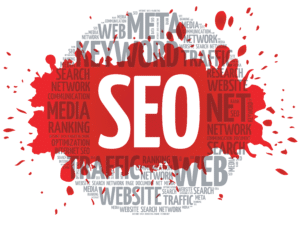When it comes to Search Engine Optimization (SEO), potential & current clients often have a range of questions as they try to understand what SEO is, how it works, and what benefits it can offer to their business.
Here are some of the most frequently asked questions (FAQ) around SEO from a client perspective:
(Each question is clickable and will navigate you to the answer of the question within this blog post)
General Understanding of SEO
- What is SEO?
- Why is SEO important for my business?
- How do search engines work?
- What are keywords and why are they important?
Costs and Timeline
- How much does SEO cost?
- How long will it take to see results?
- Is there a contract or commitment period?
Technical Aspects
- What is on-page and off-page SEO?
- What is local SEO and do I need it?
- Do I need to redesign my website for SEO?
Services and Deliverables
- What kind of services do you offer? (e.g., keyword research, link building, content creation)
- What kind of reports will I get?
- How often will we have meetings or updates?
Results and Performance
- How do you measure SEO success?
- What KPIs should I be looking at?
- What happens if we don’t see the desired results?
SEO Strategy and Techniques
- What is white-hat SEO vs black-hat SEO?
- Do you have case studies or references?
- How do you stay up-to-date with SEO changes and Google algorithm updates?
Content and Keywords
Competition and Market
Future and Scalability
- Once we achieve our SEO goals, what next?
- Can SEO help me with online reputation management?
- How does SEO integrate with my overall marketing strategy?
Navigating the intricate world of SEO can be a challenging experience, especially if you’re new to it. Fortunately, we have compiled a list of the 27 most frequently asked questions about SEO to help you better understand this critical aspect of digital marketing. Whether you’re looking to increase organic traffic to your website or improve your click-through rates, this FAQ section has something for everyone.
27 Frequently Asked Questions About SEO Answered
1. What is SEO?
SEO, or Search Engine Optimization, is the practice of optimizing a website to rank it higher in search engine results. By making specific changes to your website’s content, structure, technical aspects and even speed – you aim to attract more high-quality organic traffic.
2. Why is SEO important for my business?
SEO is crucial because it helps your website appear in relevant search queries, leading to driving more traffic to your website. Higher rankings in search results translate to more visibility among potential customers, leading to increased conversions and brand credibility.
3. How do search engines work?
Search engines use complex algorithms (that change on average EVERY DAY) to crawl, index, and rank websites based on numerous ranking factors, such as relevance, domain authority, and content quality. SEO strategy aims to align your site with these factors for better visibility in search results.
4. What are keywords and why are they important?
Keywords are the words or phrases that people type into search engines. They are crucial to SEO because optimizing your site for relevant keywords helps attract your target audience. Using a research tool for keyword analysis can be very beneficial in this process.
5. How much does SEO cost?
The cost of SEO varies based on the services you require and the agency you choose. Generally, higher-quality SEO services come at a premium but are often more effective and reliable. Classic case of “You pay for what you get” and our personal favorite here at Growth Local “Cheap SEO is not good & good SEO is not cheap!”.
6. How long will it take to see results?
SEO is a long-term strategy, and it often takes several months to start seeing significant improvements in your rankings and traffic to your website. Multiple factors play a part in estimating when results could likely come – like competition, age of your business/website, etc. Here’s a typical SEO answer “it depends”.
7. Is there a contract or commitment period?
This varies from agency to agency. Some agencies may require a long-term commitment, while others might offer monthly packages. Always ask or read the contract before signing. At Growth Local, we typically do month-to-month engagements with options to sign a 6 or 12 month contract at a discounted rate.
8. What is on-page and off-page SEO?
On-page SEO deals with elements on your own website that you can optimize, such as content, meta descriptions, and internal links. Off-page SEO refers to actions taken outside of your website, like gaining backlinks from other sites and social media activity.
9. What is local SEO and do I need it?
If you’re a local business, yes – 100%. Local SEO focuses on improving rankings in local search results. It’s essential for businesses that serve a specific geographic area or have physical locations.
10. Do I need to redesign my website for SEO?
Not necessarily. However, technical SEO factors like site speed, mobile-friendliness, and secure connection (HTTPS) can significantly impact your rankings, so you may need to consider those aspects.
11. What kind of services do you offer?
Most agencies offer a range of services, including keyword research, link building, content marketing, and more. They usually tailor their services to meet your specific needs.
12. What kind of reports will I get?
Typically, you’ll receive monthly reports outlining your SEO performance, organic traffic, click-through rates, and other important metrics. It’s not uncommon to get a reporting dashboard set up. At Growth Local, we personally use Google’s Looker Studio reports that we give our clients.
13. How often will we have meetings or updates?
This largely depends on the agency, but regular updates or monthly meetings are standard in the industry.
14. How do you measure SEO success?
SEO success is generally measured through key performance indicators (KPIs) such as organic traffic, keyword rankings, impressions and conversion rates. These metrics give you an idea of how well your SEO campaign is going.
15. What KPIs should I be looking at?
Common KPIs include organic traffic, keyword rankings, bounce rate, and click-through rates. Monitoring these will give you an overview of your SEO performance.
16. What happens if we don’t see the desired results?
If you’re not seeing expected results, it may be time to reevaluate your SEO strategy and make necessary adjustments. Remember, SEO is a long-term investment.
17. What is white-hat SEO vs. black-hat SEO?
White-hat SEO involves using ethical techniques to improve rankings, such as creating high-quality content and earning inbound links. Black-hat SEO involves tactics that manipulate search engines but are frowned upon, like buying links, and can lead to penalties.
18. Do you have case studies or references?
Most reputable agencies will have case studies or client references to demonstrate their expertise and success rates.
19. How do you stay up-to-date with SEO changes and Google algorithm updates?
Continuous learning and adaptation are essential in SEO. Most experts follow SEO news, participate in industry forums, and regularly update their skillset!
20. Do I need a blog?
Having a blog is beneficial for SEO as it allows you to create fresh, high-quality content that can rank for additional keywords. Content marketing through blogs can attract a wider target audience.
21. How do we choose the right keywords?
Keyword selection should be based on research using specialized research tools, competitor analysis, and an understanding of your target audience’s search queries.
22. What is long-tail SEO?
Long-tail SEO focuses on optimizing for longer, more specific keyword phrases. These often have lower search volume but higher conversion rates, as they capture users closer to the point of purchase.
23. Who are my competitors in terms of SEO?
Your SEO competitors are businesses that rank in the top positions for keywords relevant to your industry. A thorough analysis can reveal your primary competitors and opportunities for improvement.
24. How does my website currently rank compared to competitors?
An SEO audit can give you this information, showing you where you stand in terms of domain authority, keyword rankings, and other key metrics.
25. Once we achieve our SEO goals, what next?
SEO is an ongoing process. As search algorithms and your business evolve, so too should your SEO strategy. Continue to monitor performance and make necessary adjustments.
26. Can SEO help me with online reputation management?
Yes, SEO techniques can help improve your online presence, manage your brand reputation, and control what appears in search results for queries related to your business.
27. How does SEO integrate with my overall marketing strategy?
SEO should be one component of a comprehensive marketing plan that also includes social media, content marketing, and other digital strategies. When aligned correctly, these can create a synergistic effect, improving your overall performance and ROI.
Whether you’re a business owner looking to understand SEO or a marketer trying to explain it to potential customers, we hope this extensive FAQ section offers the valuable insights you’re seeking.
You won’t be a subject matter expert and fully understand SEO by any means after going through our 27 answered SEO frequently asked questions – but you’ll be further ahead on your journey. Bottom line is SEO is ALWAYS changing. At Growth Local, we understand that SEO is more than just a set of technical tweaks or a one-time setup also—it’s an ongoing strategy that evolves with your business, the competitive landscape, and search engine algorithms. Our expert team is committed to putting together strategies & executing within the complex world of SEO for you, providing tailored solutions that deliver real, measurable results. If you still have questions after reading this comprehensive FAQ section or if you’re ready to take your online presence to the next level, don’t hesitate to contact us. Let’s work together to boost your organic traffic, engage your target audience, and drive growth for your business!

















